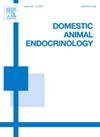The relationship between the maternal endocrine environment and late embryonic mortality (> 28 d of gestation) in cattle is poorly defined. A definitive rise and alterations in secretion patterns of prostaglandin F2α (PGF2α) concentration without luteal regression is a trademark of this period. The objective was to evaluate whether consecutively induced PGF2α pulses would alter steroid hormone production and luteal blood perfusion potentially influencing pregnancy success. Pregnant beef cows (n = 12) were selected to receive either an oxytocin injection (OT, n = 8) or saline injection (CON, n = 4) on d 30 and 31 of gestation to stimulate sequential prostaglandin releases 24 h apart. Blood samples were collected every 30 min for 1 h before and continuing for 4 h post oxytocin administration. Luteal blood perfusion was measured via Doppler ultrasound at the beginning and end of the OT challenge. Concentrations of prostaglandin F2α metabolite (PGFM) were quantified to show effectiveness of the treatment while concentrations of progesterone, estradiol and pregnancy-associated glycoproteins (PAG) were measured to examine the effect of PGF2α release. Control animals exhibited no changes in any quantified hormone and an expected numerical increase in circulating PAG concentrations. Peak concentrations of PGFM in OT cows were observed 2 h post OT administration and concentrations returned to basal levels by the end of the sampling period. Peak concentrations of PGFM were decreased on d 31 compared to d 30. Following OT administration, progesterone and estradiol concentrations did not change in response to PGF2α release but were decreased on d 31 compared to d 30. There were no changes in luteal blood perfusion in response to PGF release on d 30 or d 31. Repeated PGF2α release may alter steroid hormone production; however, it does not negatively affect pregnancy status during the transition between early and late embryonic development.


